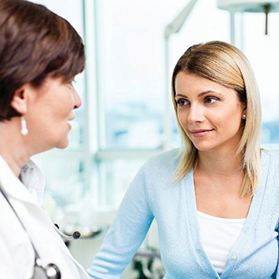- Community & News
- Service Line
I’m at Risk for Developing Breast Cancer: Now What?

Rebecca Beesley, MD, a medical breast physician with TriHealth's High-Risk Breast Program, discusses what it means to be high risk for breast cancer and what you can do about it.
What does it mean to be at high risk for breast cancer?
The two main factors that elevate a person’s risk of developing breast cancer are being female and aging. There are other factors that can make you high risk for breast cancer
A risk assessment can be done to show if a woman is high risk for breast cancer or not. This is a calculation based on factors that can affect a woman’s risk. If this number is greater than 20% lifetime risk, then you are considered “high risk” for developing breast cancer. This is in comparison to the average woman’s risk of 12-13% in her lifetime.
At TriHealth, your risk calculation will be included in your mammogram report. This is based on the information you confirmed with the technologist at the time of your mammogram.
To learn more about the factors that can affect your risk: click here
Why am I just now learning that I am at high risk for breast cancer?
It is now recommended that all women should have a breast cancer risk assessment to determine if they should begin screening for breast cancer before the age of 40.
At TriHealth we are utilizing the expertise within the Precision Medicine Institute to help us personalize healthcare for the patients we serve. We have created a streamlined approach for patients to have their risk accurately assessed. When a woman is identified as high risk for breast cancer it guides a provider on what screening options and schedule may be most appropriate for that individual.
I have been told I am at high risk of developing breast cancer. What do I do now?
Discuss with your provider what screening options may be most appropriate for you.
In addition to screening for breast cancer, individuals can actively reduce their risk for breast cancer by engaging in the following measures:
Preventive Measure #1: Lifestyle Modifications
In some cases, protecting yourself from developing breast cancer can be simple lifestyle modifications. Maintaining a healthy body weight, focusing on nutrition, and hitting the recommended physical activity goals can decrease a person’s risk for breast cancer.
Our medical breast specialists within the High-Risk Program work with each patient to identify and engage in the lifestyle modifications that can most impact their risk for breast cancer.
Preventive Measure #2: Medication
Your doctor may also recommend taking a medication, like Tamoxifen, to lower your risk. While there is good evidence to support risk reduction when taking these medications, there are also side effects that should be considered before taking one of these medications. You should discuss with your provider or a medical breast specialist to determine if taking one of these medications is beneficial for you.
Preventive Measure #3: Surgery
Surgery is an option for some women who have been identified as being at high-risk for breast cancer. Because surgery is an invasive treatment option, the benefits should be clear. This option is usually most appropriate for women who harbor certain genetic predispositions to breast cancer. Surgery can reduce your risk of developing breast cancer by about 80-90% of your original risk score.
There are two main types of surgeries used for breast cancer prevention:
- Double mastectomy – The removal of both breasts
- Ovary removal – This is a viable option for women who test positive for the BRCA1 or BRCA2 gene mutations, which are known to increase the risk of breast and ovarian cancer.
Estrogen is mainly produced by the ovaries which fuels a majority of breast cancers. By removing your ovaries, you are significantly decreasing estrogen production. Ovary removal is not as effective as double mastectomy, but it can reduce the risk of developing breast cancer significantly.
Which Option is Best for Me?
There is no correct answer for everyone. Each option has its own set of risks and benefits. It is important to discuss with your healthcare provider and a provider who specializes in these surgeries and breast cancer risk reduction.
Dr. Anne Kuritzky, one of our fellowship-trained breast surgeons, partners with her patients to counsel on the risks and benefits of these procedures. Dr. Kuritzky takes time with each patient to go in depth on the nuance of these decisions, “for a patient with substantial breast cancer risk, prophylactic bilateral mastectomy is the most effective option to decrease her chance of developing cancer and also may allow her to avoid additional therapies like chemotherapy or radiation which are utilized at the time of a cancer diagnosis. Choosing to undergo preventative surgery is a brave decision, but also complex.”
All of our breast surgeons are trained to counsel women regarding these procedures so that each patient makes the best choice for herself.
Make an Appointment with the High-Risk Breast Program
513-865-5919